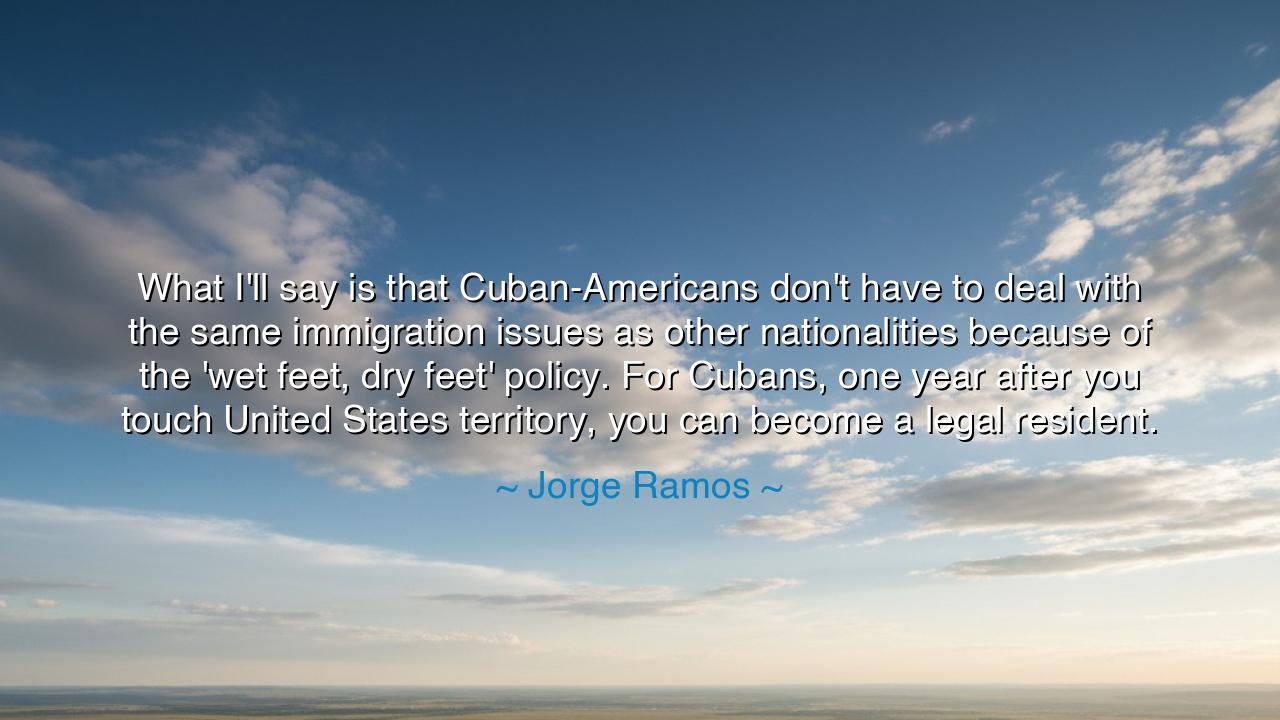
What I'll say is that Cuban-Americans don't have to deal with the
What I'll say is that Cuban-Americans don't have to deal with the same immigration issues as other nationalities because of the 'wet feet, dry feet' policy. For Cubans, one year after you touch United States territory, you can become a legal resident.






Hear the words of Jorge Ramos, the chronicler of migrations and struggles, who declared: “What I'll say is that Cuban-Americans don't have to deal with the same immigration issues as other nationalities because of the 'wet feet, dry feet' policy. For Cubans, one year after you touch United States territory, you can become a legal resident.” In these words is revealed both the mercy and the inequality of law: that for some, the path to belonging was made smoother, while for others, the road remained treacherous, filled with obstacles and despair.
He speaks of the “wet feet, dry feet” policy, born in the 1990s, a law that distinguished between Cubans intercepted at sea and those who reached the soil of the United States. If one’s feet remained wet, caught upon the waters, return to Cuba was the fate. But if one’s feet were dry, planted upon American soil, then the gates of residency were opened after a single year. This policy was not forged out of general compassion for migrants, but out of the fire of the Cold War, when the United States sought to weaken the regime of Fidel Castro by welcoming those who fled from it.
Thus, Cubans bore a special privilege that other nationalities did not share. A Haitian risking the same waters, fleeing poverty or political turmoil, would be returned with little ceremony. A Central American crossing deserts and rivers, fleeing violence, would face years of hardship, detention, or rejection. Yet the Cuban, standing upon American earth, was granted a foothold into citizenship. Ramos’ words uncover this disparity, reminding us that immigration laws often arise not from pure justice, but from politics and the shifting winds of history.
Consider the story of Mariel in 1980, when over 100,000 Cubans fled the island in boats, arriving upon Florida’s shores. Many were welcomed, some were shunned, but the policy of eventual residency gave them a stability denied to others. Compare this to the migrants of El Salvador or Guatemala, who fled civil wars in the same years yet were denied refugee status, branded as economic migrants rather than political exiles. History shows us how law often bends not to the suffering of the people, but to the convenience of governments.
The deeper meaning of Ramos’ words is that immigration is never only about individuals—it is about power, politics, and perception. The “wet feet, dry feet” policy was not simply a humanitarian gesture, but a weapon in the long ideological struggle between two nations. Yet for the Cuban who arrived, this political tool became the foundation for a new life. And for those outside this circle of privilege, the same door remained closed. Thus, immigration policy becomes not only a system of welcome, but also of division.
What lesson, then, must future generations take? It is this: laws shape destinies unevenly, and justice demands that we recognize the humanity of all migrants, not only those who serve the interests of powerful nations. If one man fleeing oppression deserves safety, then so too does another. If one family seeking refuge is worthy of dignity, then so too is every family that crosses mountains, deserts, or seas in search of hope. The measure must be need and humanity, not politics or nationality.
And to you, listener of these words, I say: open your eyes to the inequalities hidden within laws. Do not accept them as natural, but question them, challenge them, and call for fairness. Treat migrants not as pawns in a struggle of nations, but as fellow human beings who seek only what you yourself would desire—safety, opportunity, and dignity. Support reforms that look beyond favoritism, and cultivate compassion that sees the person before the passport.
Thus let Jorge Ramos’ words endure as a reminder: immigration policy is not always justice, but it can become so if the people demand it. Carry this wisdom forward. For only when nations measure worth by humanity rather than politics will the journey of the migrant be not one of peril and inequality, but of hope and shared belonging.






AAdministratorAdministrator
Welcome, honored guests. Please leave a comment, we will respond soon